The Mission of Demythologizing: Rudolf Bultmann’s Dialectical Theology
The Mission of Demythologizing: Rudolf Bultmann’s Dialectical Theology (Fortress Press, 2015)
Rudolf Bultmann’s controversial program of demythologizing has been the subject of constant debate since it was first announced in 1941. It is widely held that this program indicates Bultmann’s departure from the dialectical theology he once shared with Karl Barth. In the 1950s, Barth thus referred to their relationship as that of a whale and an elephant: incapable of meaningful communication. This study proposes a contrary reading of demythologizing as the hermeneutical fulfillment of dialectical theology on the basis of a reinterpretation of Barth’s theological project. I argue that dialectical theology was, from the start, a fundamentally missionary theology; that is to say, dialectical theology seeks to interrogate the relation between gospel and culture and prevent the collapse of the former into the latter. Bultmann’s program of demythologizing extends this missionary endeavor back into the biblical text itself. I show that the mission of demythologizing, like the mission of dialectical theology in general, was a political and revolutionary mission that has crucial implications for the pursuit of emancipatory theology and praxis today.
Read an excerpt from The Mission of Demythologizing.
Read the Syndicate symposium on The Mission of Demythologizing
Endorsements for The Mission of Demythologizing:
“This book is one of the most important and perceptive studies on Rudolf Bultmann and his often misunderstood program of Entmythologisierung (demythologizing) ever written in English.”
—Michael Lattke, Emeritus, The University of Queensland, Brisbane, Australia
“For two generations theology has ‘gone around’ Bultmann rather than through him. This evasion has led either to scholarly retreats into the false securities of the old historicism or to circling the wagons of Christian traditionalism. In this brilliant book worthy of its subject, a voice from the youngest theological generation now presents a fresh understanding of Bultmann’s daring missional program. David Congdon urges the church to look outward and forward by interpreting the news of Jesus Christ on the shifting frontiers of an emerging world.”
—James F. Kay, Princeton Theological Seminary
“Comprehensively researched and clearly written, this volume provides a convincing reinterpretation of Bultmann’s thought as well as a compelling account of its constructive significance for the future of missional theology and hermeneutics. This is an impressive interdisciplinary contribution to the literature of modern Christian thought by one of the most promising young theologians at work today.”
—John R. Franke, Evangelische Theologische Faculteit, Leuven, Belgium
“In this substantial work, David Congdon has produced the most creative and scholarly study of Rudolf Bultmann’s theology for more than a generation. In refuting the standard charge of a capitulation to modernity, he shows how Bultmann’s demythologizing project is rooted in a robust set of convictions about God as subject and the act of faith as existential and practical. This reassessment of Bultmann as a dialectical theologian is long overdue. In an increasingly secular culture which too readily dismisses Christian faith as ‘believing six impossible things before breakfast,’ Congdon’s work promises to rehabilitate Bultmann as an important resource for theological understanding.”
—David Fergusson, University of Edinburgh
“The Mission of Demythologizing systematically deconstructs the slogans with which New Testament scholars have long caricatured Rudolf Bultmann’s hermeneutic. Yet this is no mere demolition job, as David Congdon replaces the stereotype with a Bultmann fully invested in a missiological hermeneutic on behalf of dialectical theology. This book and the discussion it generates will be with us a long time.”
—Beverly Roberts Gaventa, Baylor University
“David Congdon’s work is essential reading for anyone interested in Rudolf Bultmann, Karl Barth, or Christian theology in the modern period. Meticulously researched, lucidly written, and brimming with constructive energy, this is a work of enormous sympathy, intelligence, and creativity.”
—Adam Neder, Whitworth University
“This is a quite remarkable volume. It seeks to overturn two generations and more of scholarship on the theology of Rudolf Bultmann, not only revisiting and reconceiving the relationship between Bultmann and Karl Barth, but also revisioning and rehabilitating Bultmann’s program of demythologization. . . . The result is a painstakingly researched and lucidly presented work that is both compelling and a joy to read, one which evidences the kind of depth, insight, and passion that are the hallmarks of the very finest research in theology. This volume will make an immediate and significant contribution to the reception of the work of Bultmann (and of Barth); but more than this, the constructive and generative agenda which it sets suggests that the work of Protestant theology is far from done and that tales of its demise may be somewhat premature.”
—Paul T. Nimmo, University of Aberdeen

